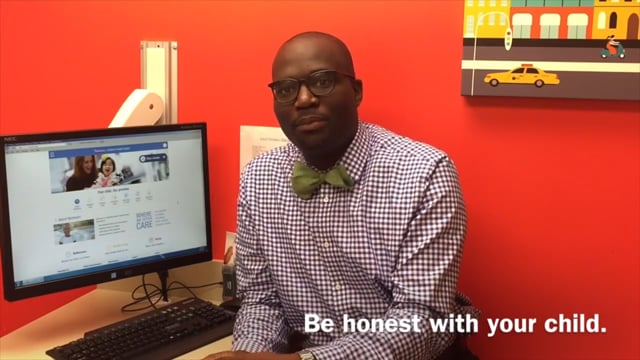How to Talk to Your Child About the News
Children hear about what's going on in the world through social media, friends, or adults' conversations. Sometimes the news is uplifting — like kids their age taking a stand on social or environmental issues. Other times, children may worry about current events and need an adult to help make sense of what's happening.

Pediatric Psychologist: Talking to Kids About Tragic Events
After something as tragic as the school shooting in Uvalde, Texas, you may be wondering what to tell your kids or how to talk to them about such horrible events, especially if they are asking questions. Nemours pediatric psychologist Dr. Roger Harrison offers some great tips on how to have this conversation. For more tips on how to discuss the news with your child, visit https://kidshealth.org/en/parents/news.html
Help your child understand the news and feel more in control by taking these steps:
Find Out What Your Child Already Knows
- Ask your kids questions to see if they know about a current event. For school-age kids and teens, you can ask what they have heard at school or on social media.
- Consider your child's age and development. Younger kids may not grasp the difference between fact and fantasy. Most kids realize the news is real by the time they are 7 or 8 years old.
- Follow your child's lead. If your child doesn't seem interested in an event or doesn't want to talk about it at the moment, don't push.
Answer Questions Honestly and Briefly
- Tell the truth, but share only as much as your child needs to know. Try to calm any fears and help kids feel safe. Don't offer more details than your child is interested in.
- Listen carefully. When kids hear about an upsetting event like a school shooting, they may worry, "Could I be next? Could that happen to me?" Older kids may have lots of questions. Focus on what your kids ask so you can help them cope with their fears. An adult's willingness to listen sends a powerful message.
- It's OK to say you don't know the answer. If your child asks a question that stumps you, say you'll find out. Or use age-appropriate websites to spend time together looking for an answer.
- Limit how much kids watch online, on TV, and social media about the events. The strong images may be upsetting for kids and teens.
Help Kids Feel in Control
- Encourage your child to talk. If your child is afraid about what's going on, ask about it. Even when kids can't control an event — like a school shooting or natural disaster — it can help them to share their fears with you.
- Urge teens to look beyond a news story. Ask why they think an outlet featured a frightening or disturbing story. Was it to boost ratings and clicks or because the story was truly newsworthy? In this way, a scary story can be turned into a discussion about the role and mission of the news.
- Teach your children to be prepared, not panicked. For example, if the news is about a school shooting, talk about the ways schools are keeping kids safe. If it's about a natural disaster, make a family plan for what you might do. If an illness is spreading, talk about ways to protect yourself and others.
- Talk about what you can do to help. After a tragic event, finding ways to help can give kids a sense of control. Look for news stories that highlight what other people are doing. Articles such as School Violence: What Students Can Do may be helpful for older kids and teens.
- Put news stories in context. Broaden the discussion from a specific news item about a difficult event to a larger conversation. Use it as a way to talk about helping, cooperation, and the ways that people cope with hardship.
Limit Exposure to the News
- Decide what and how much news is appropriate for your child. Think about how old your kids are and how mature they are. Encourage them to take breaks from following the news, especially when the topics are difficult.
- Keep tabs on the amount of difficult news your child hears. Notice how often you discuss the news in front of your kids. Turn off the TV so the news is not playing in the background all day.
- Set limits. It's OK to tell your kids that you don't want them to have constant exposure and to set ground rules on device and social media use.
- Watch the news with your child and talk about it. Turn off a story if you think it's not appropriate for your child.
Keep the Conversation Going
- Talk about current events with your child often. Help kids think through stories they hear – good and bad. Ask questions like: "What do you think about these events?" or "How do you think these things happen?" With these types of questions, you can encourage conversation about non-news topics.
- Watch for stress. If your child shows changes in behavior (such as not sleeping or eating, not wanting to be around people, or worrying all the time), call your child's doctor or a behavioral health care provider. They can help your child manage anxiety and feel better able to cope.


